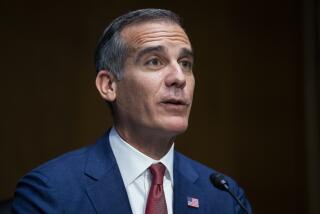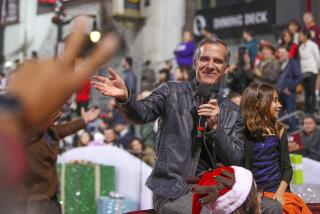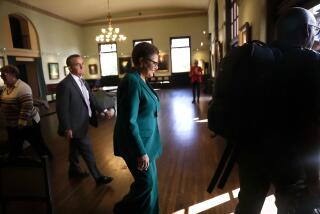‘He’s pretty darn lucky.’ Garcetti’s riding the wave of L.A’s. ‘renaissance’ as he runs for reelection
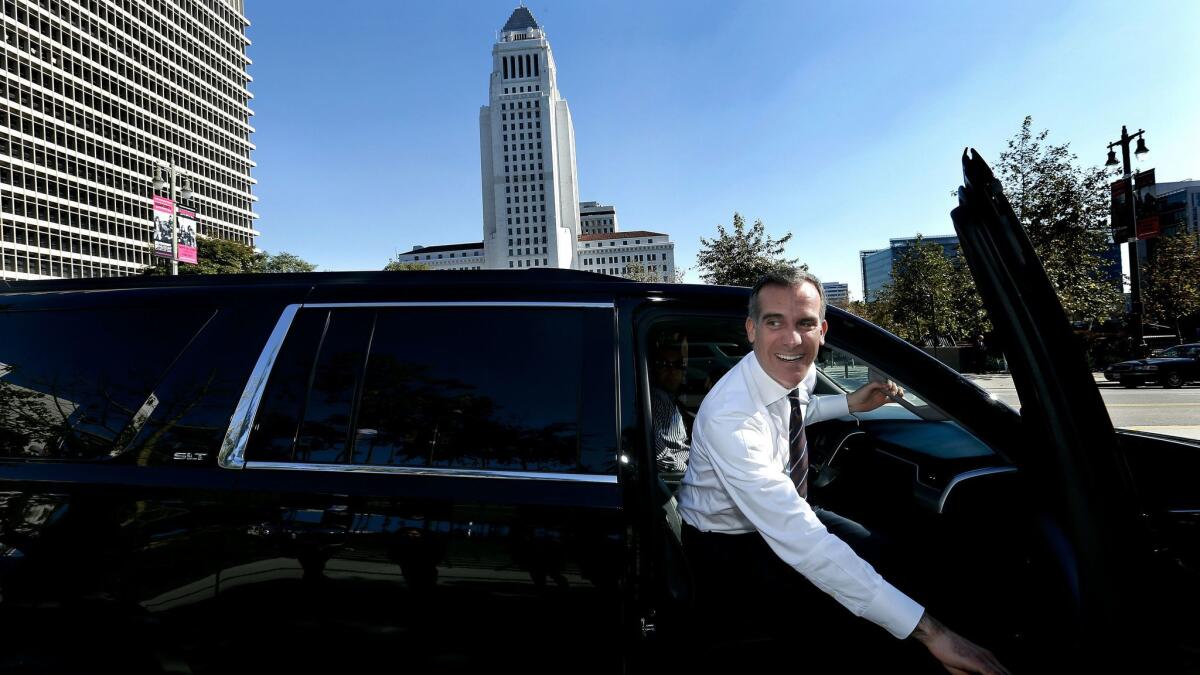
With a vote on his reelection just weeks away, Mayor Eric Garcetti is framing his tenure as a pivotal time in Los Angeles history.
The construction of rail lines across the city, he says, is one of many signs of robust urban renewal. Nothing, he argues, has transformed Los Angeles so dramatically since William Mulholland built the aqueduct that brought Sierra Nevada water to the parched San Fernando Valley in 1913.
Despite an uptick in crime and a surge in homelessness, cranes across the skyline attest to the city’s comeback from a punishing recession.
But has Garcetti been leading the way? Or is he just the beneficiary of good timing?
In some areas, the mayor’s influence is undeniable, most visibly in securing tens of billions of dollars for public transit projects.
In many others, the forces driving voters’ optimism about the city — and easing his path to reelection next month — have little or nothing to do with Garcetti, who became mayor just as the recovery from the Great Recession was taking hold.
“He’s pretty darn lucky,” said Christopher Thornberg, a Los Angeles economist. “This city has been in the midst of a renaissance.”
The Expo Line between Santa Monica and downtown Los Angeles opened last year, a boon for the traffic-clogged Westside. Stretches of Crenshaw and Wilshire boulevards have been ripped open for subway extensions along central traffic arteries. Prior mayors — and many others — worked for decades to accelerate those projects.
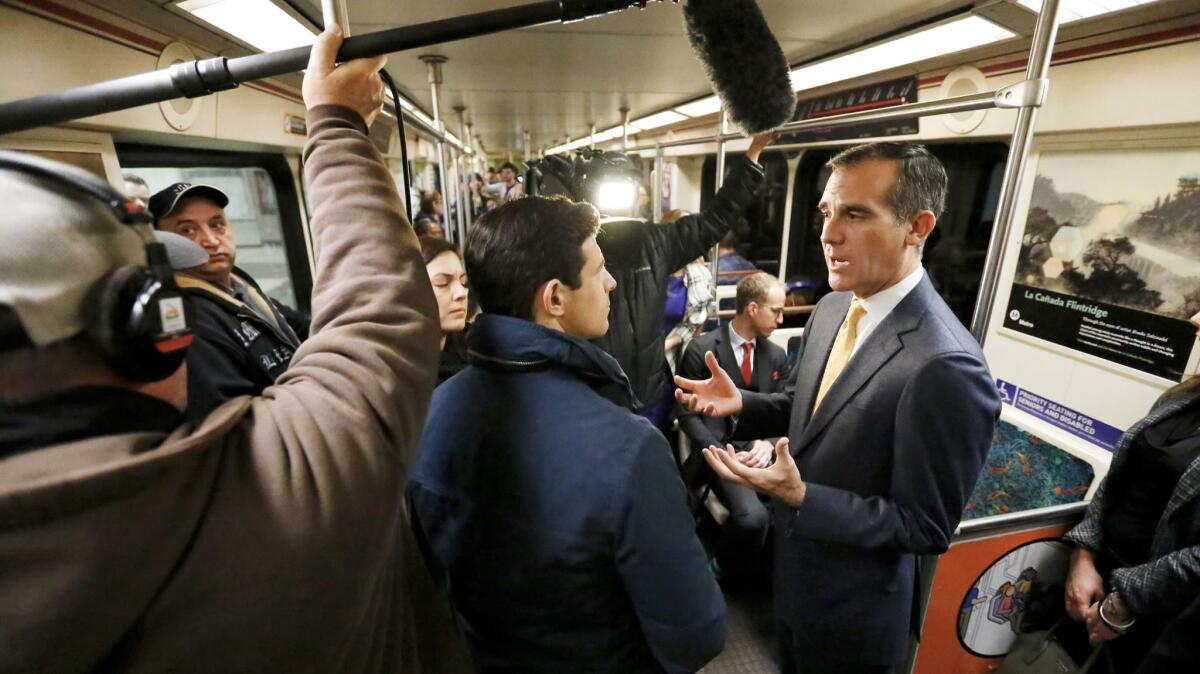
Mayor Eric Garcetti talks to reporters while riding the Metro Red Line on Dec. 6, 2016. The construction of rail lines across the city, he says, is one of many signs of robust urban renewal.
After more than two decades with no professional football team, the Rams have returned, albeit to Inglewood. The Chargers will soon join them. Los Angeles has made the final round of bidding to host the 2024 Summer Olympics.
Thriving nightlife scenes have revived once-seedy parts of downtown and Hollywood and enlivened the industrial Arts District on the Eastside.
The city’s cultural life is booming, too. The Broad art museum has opened downtown. Filmmaker George Lucas has picked Exposition Park as the site of his new museum. A rebuilt Los Angeles County Museum of Art spanning Wilshire Boulevard will remake Miracle Mile in the early 2020s.
If enough federal money can be found, an 11-mile stretch of the Los Angeles River, from Griffith Park to downtown, will be restored for public recreation in the decades ahead.
In a city infamous for its smog, racial strife and earthquakes, the revitalization carries political rewards for the mayor, regardless of his limited role.
Garcetti, 46, headed the campaign last year to win voter approval of a sales tax hike that will fund decades of transit projects, matching a similar achievement by his predecessor, Antonio Villaraigosa. He also played a big part in crafting the Olympics bid, advancing the L.A. River plan and tightening seismic safety standards for buildings.
But Garcetti has not followed Villaraigosa’s lead in trying to force improvements on public schools that many parents find substandard.
And what Garcetti casts as his record creating jobs — easing a business tax and lobbying for state subsidies to keep film production in California — had no bearing on the city’s upturn, said Thornberg, the founder of Beacon Economics, a consulting firm. He called Garcetti a “glorified cheerleader.”
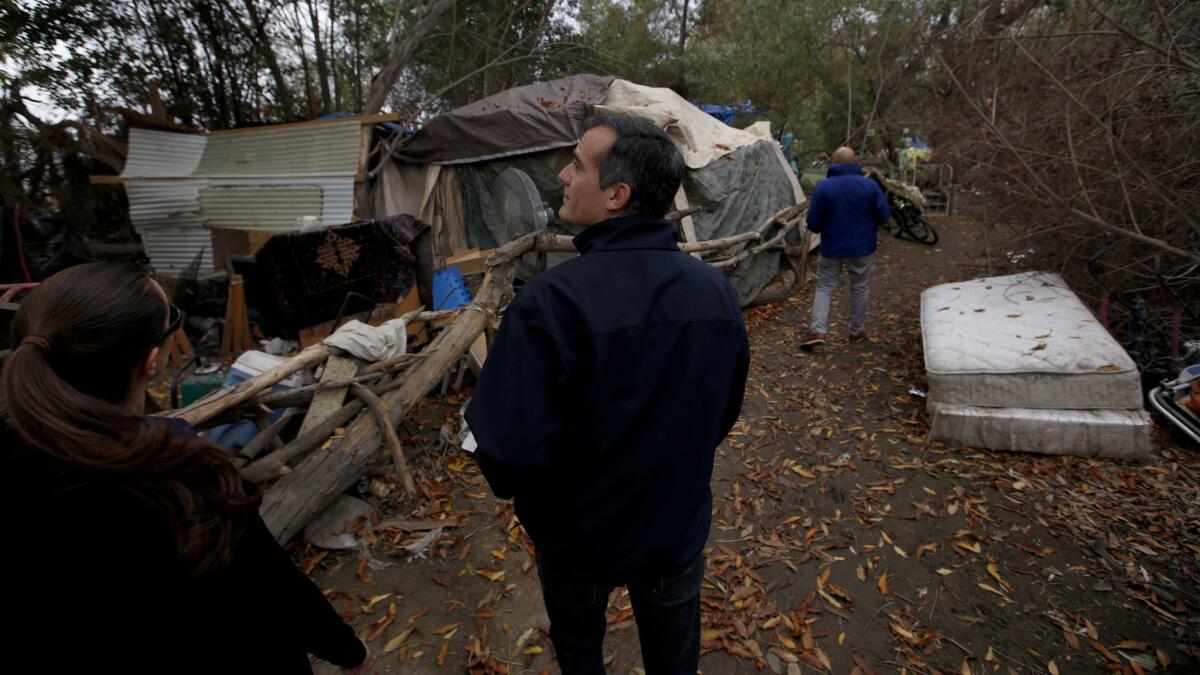
Mayor Eric Garcetti talks with homeless Angelenos at an encampment around the Sepulveda Basin in Encino on Dec. 15, 2016 For L.A. voters, homelessness has eclipsed crime, traffic and schools as the top concern, according to private polls.
Edward Leamer, director of the UCLA Anderson Forecast, was equally tepid, saying job growth on Garcetti’s watch has been no better than in other big cities.
“He hasn’t done any damage,” Leamer said.
With an upcoming shift in the city’s election calendar, the winner of the mayor’s race will serve an unusually long term of 5½ years. Garcetti faces 10 opponents on the March 7 ballot, but nobody well known has stepped up to challenge him.
“The really ambitious people don’t go on suicide runs,” said Eric Hacopian, a campaign strategist not involved in the race.
Garcetti reported $2.4 million in his campaign account as of Jan. 21. He plans to spend much of it on advertising that could buttress his standing for a potential run next year for governor or U.S. Senate. His rivals reported an average of less than $9,000 apiece.
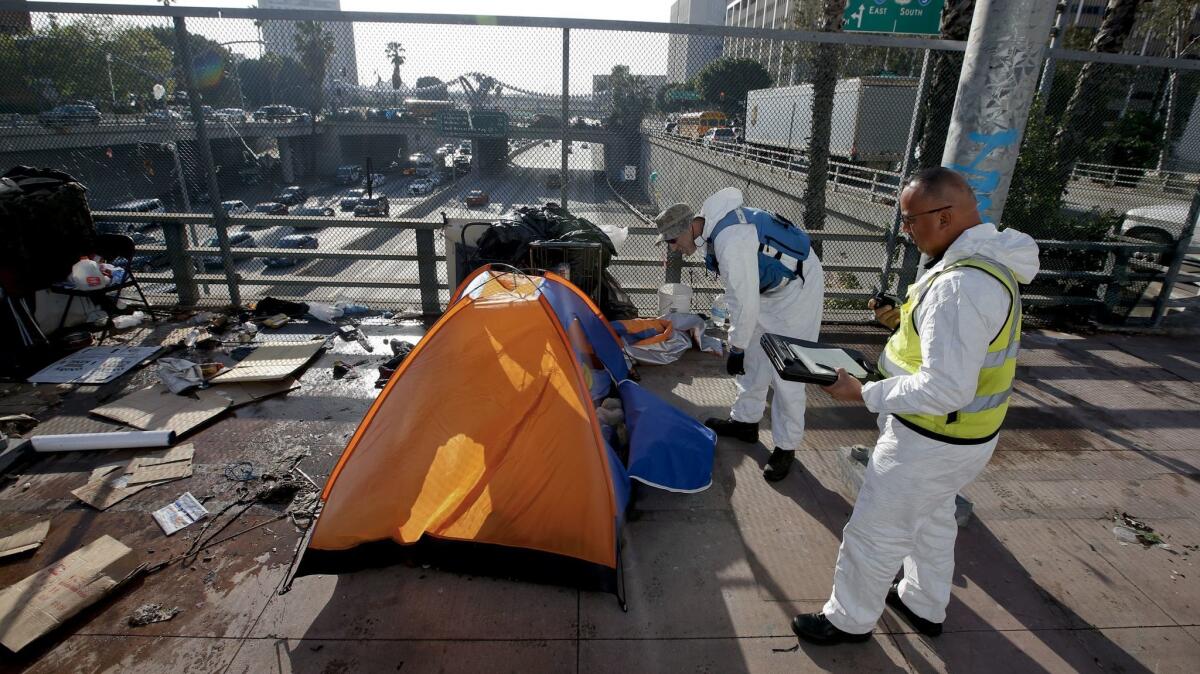
For L.A. voters, homelessness has eclipsed crime, traffic and schools as the top concern, according to private polls. Ragtag encampments have popped up in every corner of the city, cluttering overpasses, underpasses, sidewalks and vacant lots. Critics say Garcetti has been slow to clear them or provide shower and bathroom access to those on the streets.
In an interview, the mayor said he deserved credit for housing 8,000 veterans and persuading voters last year to pass a measure to build up to 10,000 apartments.
Garcetti also suggested that a hike in the city’s minimum wage to $15 (the City Council upped his opening proposal of $13.25) will relieve some poverty.
The spread of homelessness “breaks my heart every day,” the mayor said. He emphasized that other cities are facing the same problem.
H. Eric Schockman, a Los Angeles political scientist, said nothing short of a national Marshall Plan — the U.S. aid program for rebuilding Western Europe after World War II — would effectively reduce homelessness.
“These little dribs and drabs of ballot initiatives, and throwing money here and there — it’s Band-Aids,” he said.
Another challenge for Garcetti is the jump in crime from the historic lows reached under Villaraigosa. Garcetti said it was due mainly to the release of inmates under a statewide pullback on incarceration of drug dealers, thieves and other low-tier criminals.
Garcetti also has had trouble navigating racial politics, an essential part of the mayor’s job in a city with a history of police brutality and riots.
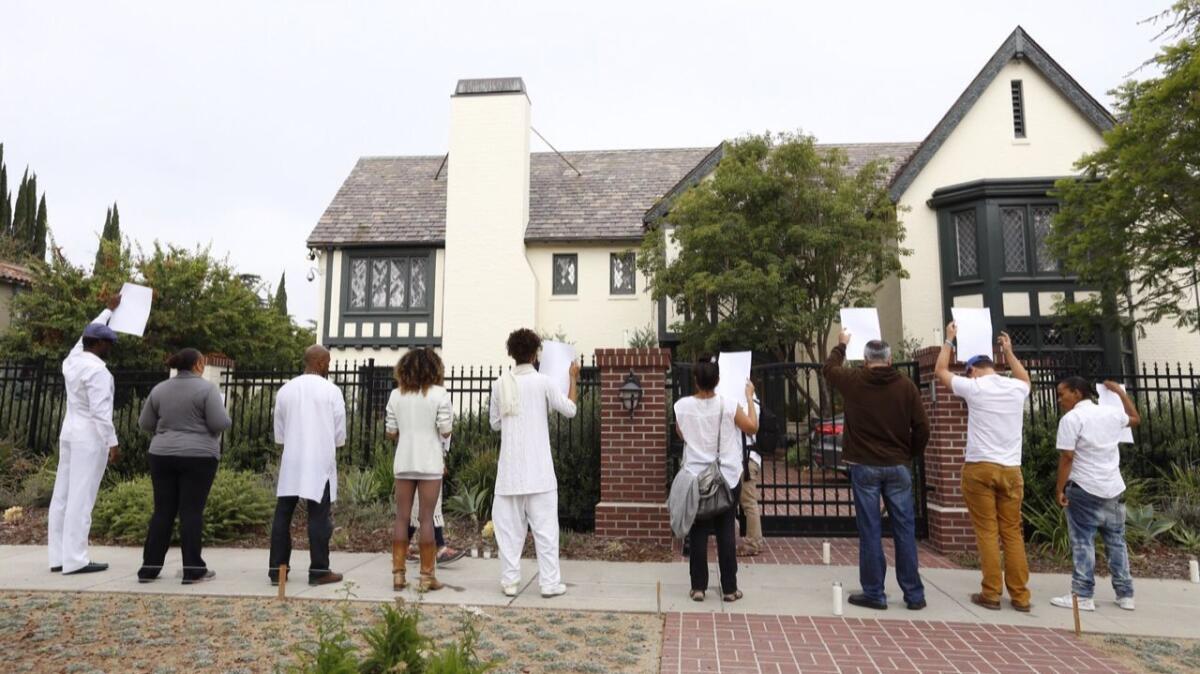
Protesters gathered outside Mayor Eric Garcetti’s home on June 7, 2015, calling for him to take action over the fatal shooting of Ezell Ford.
Over the last few years, Los Angeles has largely been spared the sort of unrest that has erupted in other U.S. cities after police officers killed unarmed African Americans. But Black Lives Matter organizer Melina Abdullah faulted Garcetti for standing by Police Chief Charlie Beck when he has cleared officers of wrongdoing in fatal shootings, most famously of 25-year-old Ezell Ford in South L.A. in 2014.
“This is completely disrespectful of the black community, and also is an indication that our humanity, our lives don’t matter to the mayor,” she said.
From 2012 to 2014, the LAPD investigated 1,356 allegations of biased policing, but upheld none of them. “They’re completely unwilling to admit that they have a problem,” Abdullah said.
Garcetti, who fared poorly among black voters in 2013, denied the city was ignoring complaints of officer misconduct. He pointed to LAPD training of officers to prevent racial bias.
“Each incident is a hot point, and you can never really resolve policy based on an incident,” he said. “What you can do is continue to improve culture in policing and find the right people.”
When he took office, Garcetti called himself a “back-to-basics” mayor who would bring diligence to the mundane: filling potholes, paving streets, fixing sidewalks, trimming trees.
He conceded his record was mixed, but insisted there was “more good news than bad news.”
The city’s chronic budget shortfalls have let up somewhat. But its plan to borrow up to $70 million to cover lawsuit settlements and judgments speaks to its enduring fiscal troubles.
Looking ahead, Garcetti named homelessness, traffic and crime as his top priorities. But friends and rivals alike doubt he will resist the temptation to seek higher office not long after his reelection.
“If there’s a way that people say you can serve this city as well, or even better, in some other job in the future, I don’t close that off,” Garcetti said. “But I want to be clear: I believe it’s all about one election at a time, and this is the job I love. This is the job I want to do.”
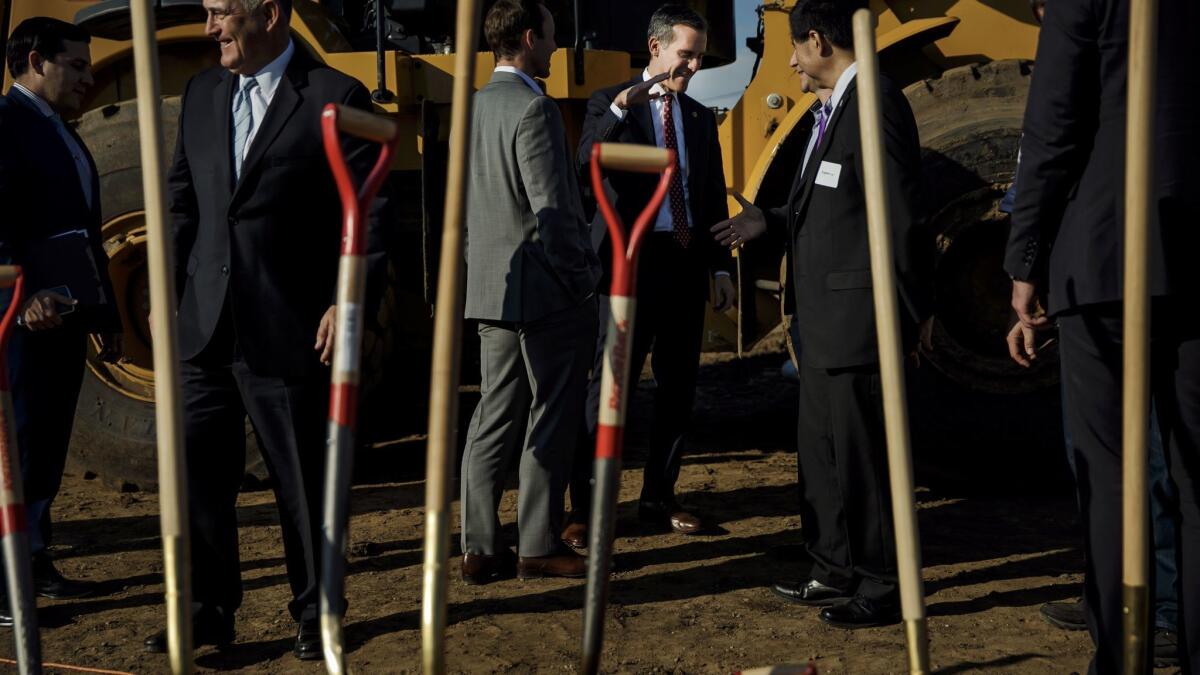
Mayor Eric Garcetti, center, at a groundbreaking ceremony for a 160-unit affordable apartment project next to the 110 Freeway in South Los Angeles on Jan. 26, 2017.
ALSO
L.A. is too hot. Here’s how scientists are trying to cool the city down
Former rent-controlled apartments in Hollywood are razed amid protests and bureaucratic confusion
More to Read
Sign up for Essential California
The most important California stories and recommendations in your inbox every morning.
You may occasionally receive promotional content from the Los Angeles Times.
